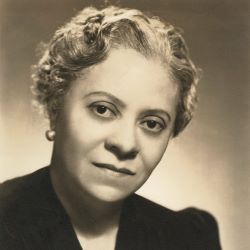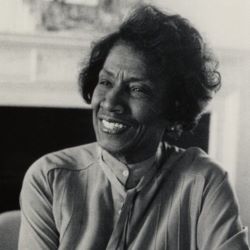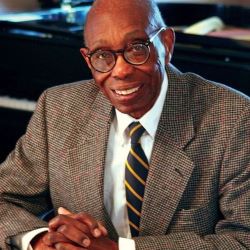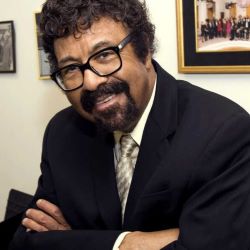In honor of the 2024 Black History Month theme, African Americans and the Arts, Levine faculty member Johnny Walker shared his playlist of composers whose music he is excited to revisit, listen to, and play. Read on to learn more about these remarkable artists and discover their incredible works. From groundbreaking pioneers to rising stars, these musicians have shaped the world of music and beyond. They have defied barriers, broken boundaries, and continue to rewrite the score of music history. We encourage you to explore their work and perhaps learn to play one of their pieces for yourself! For more resources on celebrating Black History Month through musical discovery, visit our resource library.
 Florence Price (1887 – 1953)
Florence Price (1887 – 1953)
Florence Price was a trailblazer in the realm of American classical music. Though she faced many biases and challenges due to her race and gender, she persevered, creating a diverse body of work encompassing over 300 compositions. Her works for orchestra, choir, chamber ensembles, solo instruments, solo voice, and more stand as testaments to her versatility, technical prowess, and profound artistic voice. Notably, her Symphony in e minor, premiered in 1933 by the Chicago Symphony Orchestra, cemented her place in history as the first African American woman to have a symphony performed by a major orchestra. In 2009, 56 years after her death, a trove of works that would have otherwise been lost was discovered in an abandoned house in Illinois, leading to a much-belated revival of interest in Price’s music. In 2022, the Philadelphia Orchestra’s recordings of her Symphonies Nos. 1 and 3 received the GRAMMY award for “Best Orchestral Performance,” and her orchestral work Ethiopia’s Shadow in America was featured in Levine’s 2023-24 Guided Listening season.
Watch: Florence Price’s Violin Concerto No. 2, performed by the Urban Playground Chamber Orchestra
 William Grant Still (1895 – 1978)
William Grant Still (1895 – 1978)
William Grant Still Jr. was a prolific American composer and conductor who wrote nearly 200 works, including symphonies, operas, and ballets. He often incorporated African American themes and rhythms into his music and was a key figure in the Harlem Renaissance, an important cultural movement centered around the New York neighborhood in the early 20th Century. He was the first American composer of any race to have an opera, Troubled Island, produced by the New York City Opera, and the first African American to conduct a major symphony orchestra, the Los Angeles Philharmonic Orchestra, in 1936. His work, A Bayou Legend, was also the first opera by an African American composer to be aired nationally on television. Still’s Old California and The American Scene was featured in Levine’s 2022-23 Guided Listening season.
Watch: William Grant Still’s Afro-American Symphony, performed by the Tampa Bay Symphony
 Undine Smith Moore (1904 – 1989)
Undine Smith Moore (1904 – 1989)
Undine Smith Moore began her musical career as a classical pianist but discovered her true calling in vocal music. Much of her work drew inspiration from Black spirituals and folk music, weaving them into choral works of exceptional depth and beauty. She was a longtime teacher at Virginia State University (then Virginia State College), where she co-founded and co-directed the Black Music Center to bring Black lecturers, composers, performers, and musical groups to the campus and inspire the next generation of musicians. Moore received many honors during her distinguished career, including the Virginia Governor’s Award in the Arts, an honorary doctorate from Indiana University, and the Candace Award from the National Coalition of 100 Black Women. Twenty-eight years after her death, she was named among the Virginia Women in History.
Watch: Undine Smith Moore’s Afro-American Suite, performed by Levine faculty members Johnny Walker (cello), Heidi Schuller (flute), and Dana Smith (piano) at Levine Presents: Journey Across the World and Back
 George Walker (1922 – 2018)
George Walker (1922 – 2018)
Born in 1922 in Washington, DC, George Walker wasn’t just a gifted composer, pianist, and organist – he was a pioneer. Walker entered Oberlin Conservatory at fourteen before continuing his studies at the Curtis Institute in Philadelphia, where he was the school’s first Black graduate, and then on to Eastman School of Music, where he was the first Black student to earn a doctorate. His music combined influences from jazz, folk songs, hymns, and classical music alike. In 1996, he became the first Black composer to be awarded the Pulitzer Prize in Music. His winning work, Lilacs for voice and orchestra, was premiered by the Boston Symphony Orchestra. The following year, DC Mayor Marion Barry proclaimed June 17 “George Walker Day.” Throughout his career, Walker wrote close to 100 works and received commissions from some of the most prominent conservatories and orchestras in America, including the New York Philharmonic and the Cleveland and Philadelphia Orchestras.
Watch: George Walker’s Lilacs, performed by the London Symphony Orchestra
 David Baker (1931 – 2016)
David Baker (1931 – 2016)
Composer and educator David Baker was born and raised in Indianapolis, IN, where he attended school in a segregated public school system. Starting his career as a trombonist, he received both his undergraduate and graduate degrees in music education from Indiana University in Bloomington before attending the Lenox School of Jazz in Massachusetts on scholarship. Following a car accident where he suffered a jaw injury, Baker picked up the cello and dedicated his long and distinguished career to education and composition. An early teaching position at Lincoln University in Missouri, which carried anti-miscegenation laws, was cut short when he was dismissed after marrying the white opera singer Eugenia Marie Jones. Eventually, Baker returned to teach at his alma mater, Indiana University’s Jacobs School of Music, where he founded the school’s jazz studies program and served as its chair at a time when few music schools accepted jazz as a legitimate art form. Baker would continue to teach at IU, where he earned the title of Distinguished Professor of Music, until his passing in 2016.
David Baker penned many analytical and pedagogic texts, and his compositions blended jazz and classical genres. He even poked fun at the traditions of classical concert halls with his Concertino for Cellular Phones and Orchestra, which relies on (instead of shuns) ringtones from the audience. He received hundreds of commissions over the course of his life, from orchestras like the New York Philharmonic to chamber groups such as the Beaux Arts Trio and the Audubon String Quartet.
Listen: David Baker’s Cello Sonata performed by Janos Starker and Alain Planès

Photo by Jiyang Chen

Photo by Jiyang Chen
Jessie Montgomery (1981 – )
Jessie Montgomery is an American violinist, composer, chamber musician, and music educator. Her compositions weave classical music with elements of vernacular music, poetry, improvisation, and social justice. Montgomery started learning violin at the Third Street Music School Settlement, a community music school in New York City, before continuing her education at the Juilliard School and New York University. Since 1999, Montgomery has been involved with the Sphinx Organization, a Detroit-based nonprofit that supports young Black and Latinx musicians, from whom she received the Sphinx Medal of Excellence. In 2021, she became the Chicago Symphony Orchestra’s Mead Composer-in-Residence. Montgomery was awarded the ASCAP Foundation’s Leonard Bernstein Award and was selected to participate in the New York Philharmonic’s Project 19, celebrating 100 years of the 19th Amendment. Jessie Montgomery’s breathtaking work for string quartet Strum was featured in the 2023-24 season of Levine Presents.
Watch: Jessie Montgomery’s Starburst, performed by the Minnesota Orchestra
 Carlos Simon (1986 – )
Carlos Simon (1986 – )
Born in Washington, DC, Carlos Simon is a rising star in the world of classical music and holds the inaugural position of Composer Chair of the Boston Symphony Orchestra. He has returned to the nation’s capital as the Composer-in-Residence at the John F. Kennedy Center for the Performing Arts and as an Associate Professor at Georgetown University. His music blends the sounds of his gospel upbringing with the traditions of Western classical music, creating something truly unique and powerful. His work brea(d)th was written as a response to George Floyd’s murder, highlighting America’s history of systemic oppression against Black Americans. He was nominated for a GRAMMY in 2023 for his album Requiem for the Enslaved, which commemorates the stories of 272 enslaved men, women, and children sold in 1838 by Georgetown University.
Watch: The Music of Carlos Simon, performed by the National Symphony Orchestra
Ready to keep exploring?
Visit our recent blog post, Celebrating Black History Month Through Musical Discovery, to learn more. There, you’ll find a list of resources for more information about these composers and others, as well as sheet music so you can bring these incredible artists into your repertoire. Happy learning!

 William Grant Still (1895 – 1978)
William Grant Still (1895 – 1978)  Undine Smith Moore (1904 – 1989)
Undine Smith Moore (1904 – 1989)  George Walker (1922 – 2018)
George Walker (1922 – 2018) 
 Carlos Simon (1986 – )
Carlos Simon (1986 – )